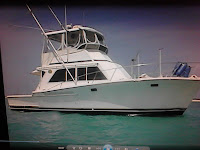The Art of Docking
By boatguy Ed
Have you ever gone
to a waterfront restaurant by boat? Do you know that in a recent
survey of non-boaters, they really, really envy people who arrive by
boat at the restaurants? Many people have entered the sport of
boating just so they can be among those who are envied.
Despite surveys
pointing to boaters being happier, more contented and better lovers,
non-boaters slough off all that and concentrate on their desire to
simply stepping off a boat onto a restaurant’s dock as the main
reason they might one day get into boating.
In effect, you as
boaters have a responsibility to boat to more restaurants. Not just
for the great food or the enjoyment of being on the water with
friends but to preserve the boating lifestyle. A skillful landing is
often more difficult than it seems to non-boaters. Observers often
break into animated discussions about a less a skillful landing when
the skipper misjudged wind or tide or the speed needed to make the
smooth landing.
I asked the
President of “Rub-Rails-Are-Us” what is the most common mistake
made when coming into an unfamiliar dock. “Overconfidence is the
cause of most damage in docking at a strange place. Most boaters just
rush right in and misjudge the environment around the dock!”
I think he is
‘right on’ with that statement. I have seen many good landings, a
few great landings and a whole lot of mediocre ones. The real bad
landings tend to stick in your memory. A really bad landing has to
hole the boat or knock down the dock. But even if the boat destroys
the dock it can still be judged to be a mediocre landing if the
pilings that support the dock have been eaten away by marine borer
worms.
We all want to look
good when we arrive at the dock and we are well aware of the envious
eyes fixed on us and our boat. Some boaters feel a pressure to zoom
right into the open space, hit reverse and toss a line onto a piling.
Whenever I see someone attempt that maneuver I think they are
transplanted lake boaters. When the lake is calm, the boat has very
few forces working on it so the rapid landing can be accomplished.
Here in tidal
saltwater, there is a mysterious force at work, tides which are the
worst enemy of lake boaters. No tides on lakes. Even the Great Lakes
don’t have tides but they’re so big that I always assumed they
had. I would be great at docking in lakes because I’m pretty good
at docking in tidal saltwater. Notice I didn’t say great because I
don’t want to jinx myself.
“Doesn’t it
hurt the boat to hit the dock that hard,” a fellow diner asked me
after we watched a mediocre landing.
“Naw, that’s
how you’re supposed to do it! Some places even buy you a drink if
you hit the dock hard enough to shake the entire restaurant,” I
said.
“Oh yeah?” It
took a full five seconds for him to realize that I was cracking wise.
You should have seen the look he gave me.
The survey results
about docking envy might be even higher if more of us did a better
job at landing our boat. So how do you overcome the forces at work?
Understanding the
art of docking starts with observing the forces. A great landing
begins with the skipper allowing his vessel to settle in front of the
slip he intends to enter. This pause usually confuses non-boaters and
lake boaters.
“Why is he
waiting,” I've heard non-boaters ask their companions. I want to
explain but why eliminate the mystery but is what I'd like to say;
Stopping for a few seconds to determine the direction and speed of
tide and wind is key. In the trucking business, the pull-up is said
to be the truck drivers best friend. It straightens out the errant
trailer that is being backed into a loading dock. A skipper backing
out and repositioning the boat’s angle and speed of the approach
may appear hesitant to the uneducated but is the 'docking skipper’s
best friend.'
Sadly, the slow
approach often confuses non-boaters who then rush down to the dock to
help. It should be the other way around. They should scurry down and
help pick up the passengers on the fast approach boats who were
knocked off their feet by the collision with the dock.
So the next time
you make a slow, skillful landing at a waterfront restaurant
congratulate yourself for creating more potential boaters. But don’t
get nervous knowing all those envious eyes are watching!
Boatguy Ed is a
marine manufacturer, avid boater and past commodore of the “Dead
End Canal Yacht Club.” Boat safe and send questions and comments to
boatguiEd@aol.com
or this publication. This blog/column is meant for educational purposes only. Any resemblance to real persons, living or dead, is purely coincidental. Void where prohibited. Some assembly required. Do not read while operating a vehicle or heavy machinery. Keep sending those great questions and comments! (Contact) boatguied@aol.com






Comments